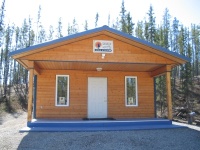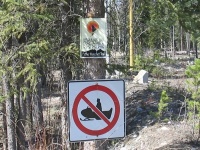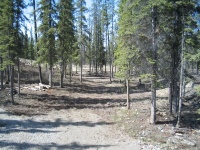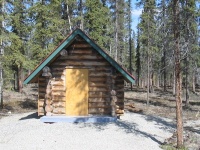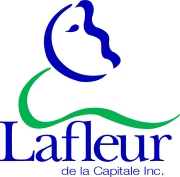Let's Smoke Some Track: Gary Bailie and the Kwanlin Koyotes
By: Tom McCarthy (2005/05/25)
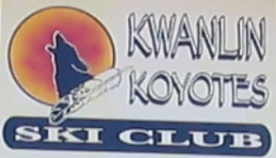
This is a story about one guy with a vision and the courage and determination to turn his vision into reality. This is about a guy making a difference, every day, against the odds, for his community and for his sport. This is a story about a hero.
The story takes place during the long winters of Whitehorse, Yukon Territory. Whitehorse is Yukon's capital, but it only has a population of about 20,000. It is a great town with big-city services, but a small-town atmosphere. Visitors entering a restaurant get greeted with a friendly "where are you guys from?", as if they're wearing shirts that say 'Out-of-towner.' In May, the sun rises around 5:30 and sets for good at 11:30, allowing lots of time for exploring the endless singletrack running and biking trails that lead away from town.
Travel north-west from downtown, up 'Two Mile Hill', across the Alaska Highway and up past the recreation complex (the home of the Whitehorse Ski Club trail system), and one enters McIntyre subdivision, home of the majority of the members of the Kwanlin Dun First Nation. Kwanlin Dun is a First Nation of close to one thousand members, one of the largest in the Yukon. Kwanlin Dun are a group of innovative, intelligent, funny and deeply rooted people who have suffered through the same long list of social and cultural injustices as all First Nation people in Canada. They originally lived on the banks of the Yukon River in what is now downtown Whitehorse, but have been relocated twice, once illegally and against their will. Their children were, for decades, taken away from their families and forced into religious residential schools operated by sexually, physically, and culturally abusive priests. They have long been denied the right to practice their traditional sustenance lifestyle of hunting and fishing by the encroachment and enforcement of laws and regulations. The sense of personal responsibility and work ethic has been eroded by devastating federal government (Indian Act) policies and programs, which consistently take away incentives to participate in a modern economic system.
Not surprisingly, the Kwanlin Dun people suffer from the effects of this tragic inheritance. Alcoholism and drugs are rampant in the community. Perhaps up to half of all babies are born with Fetal Alcohol Syndrome or Fetal Alcohol Effects. Unemployment is chronic, and the number of people receiving income assistance (welfare) is many times the national average. Many children grow up in transient households where violence and abuse is common, and come of age in a world where the only path they see leads to substance abuse and dependency on income transfers.
Gary Bailie also grew up in this world. However, he was touched by another little-known hero, a Catholic priest named Father Mouchet. Father Mouchet came to the North in the 1965 and started the Territorial Experimental Ski Team (TEST) program with meager funding. His aim was to teach native youth the benefits of a healthy lifestyle, to show them the healing power of the outdoors, and to develop confidence and skills. He set up ski programs in Old Crow, Inuvik, and Whitehorse. With little technical know-how and only a love of skiing and the outdoors, Father Mouchet succeeded beyond his wildest dreams. By the 1972 Olympics, seven of the nine members of the Canadian Olympic Ski Team were native, led by the famous Firth sisters, Sharon and Shirley.
Gary Bailie was one of Father Mouchet's recruits. Though he never raced internationally for Canada, he reached as high as the Equipe L'Espoir, what is now known as the National B team (or Team 2010.) Skiing got to Gary, and gave him drive and vision; as he says, skiing is "part of me, part of who I am; it's more than a lifestyle, it's a way of life." When Gary finished his skiing, he returned to Whitehorse, and after a series of undertakings, including operating his own construction business, he now manages the capital infrastructure for Kwanlin Dun First Nation.
Several years ago, Gary decided to give the gift of skiing back to the community. He had a young daughter, and wanted her and all the youth of the community to have the choice of a healthy lifestyle, much like Father Mouchet had given him a choice. As manager of the capital program, he used wildland fire suppression funding to hire a crew to cut fuel breaks on Kwanlin Dun Lands. These fuel breaks became the Kwanlin Koyotes ski trail system. He made the trails connect to the neighbouring Whitehorse Ski Club network,. allowing easy access to a first-class racing trail system. He scratched together the funding to buy a top-of-the-line snowmobile track-setter to groom his trails. He built a small wood cabin at the trailhead (he has recently added an almost-complete wood sauna house.) Then, he managed to find more funding, with the help of the Kwanlin Dun First Nation government, to buy perhaps two dozen sets of skis, boots and poles of all sizes and both techniques. He bought wax benches and some wax to set up in the cabin.
Now, for the past several winters, Gary has been operating a ski program for Kwanlin Dun youth. He's named the group the Kwanlin Koyotes, as the sign at the top of the cabin proudly proclaims. Twice or three times a week, he holds ski practices, where he teaches the same things as Father Mouchet taught him: it's about the attitude, about the rhythym and flow of the sport, about the energy of being outside. Gary feels that skiing can be an important part of aboriginal culture; "Culture is an evolving thing, right? It's never stable. I think if we had had the choice of skis and snowshoes back in the old days, there's no way we would have snowshoed!" Gary has a flipchart where he tracks the participation of the Koyotes with sticky-stars; many didn't miss a practice the entire winter. He can't stop talking about the progress some of the kids have made, and about the fun they're having.
Meeting Gary is like running head-first into a blizzard of positive energy. He can't find enough hours in his day to devote to his community. He sees skiing as a great alternative to drugs and alcohol: "Like I say to the kids, 'let's go smoke some Track'! Who needs those drugs when you've got skiing?" As well as operating the Kwanlin Koyotes, he is involved in myriad community activities, including organizing an annual music festival. On top of all that, he still finds time to train on a daily basis, just for the love of it. And he's got more ideas popping out all the time, for new trails and new activities.
Don't be surprised, in a few years, to see a stronger Yukon Ski Team competing at National Championships. A guy like Gary cannot help but transfer his energy and passion down to a few of the youth. Like Father Mouchet before him, Gary is in the process of creating a legacy.
And the federal government might also finally be getting it right. They've negotiated Self-Government and Final Agreements with 11 of the 14 First Nations in the Yukon. These agreements are designed to transfer sovereignty and decision-making ability back into the hands of the First Nations. With these new tools, First Nations can rebuild their traditions and institutions and take a leadership role in building a stronger Canada. With heroes like Gary showing First Nation youth the right path, this process will happen faster than anyone expects. And they'll be skiing past you faster than you expect, too.
